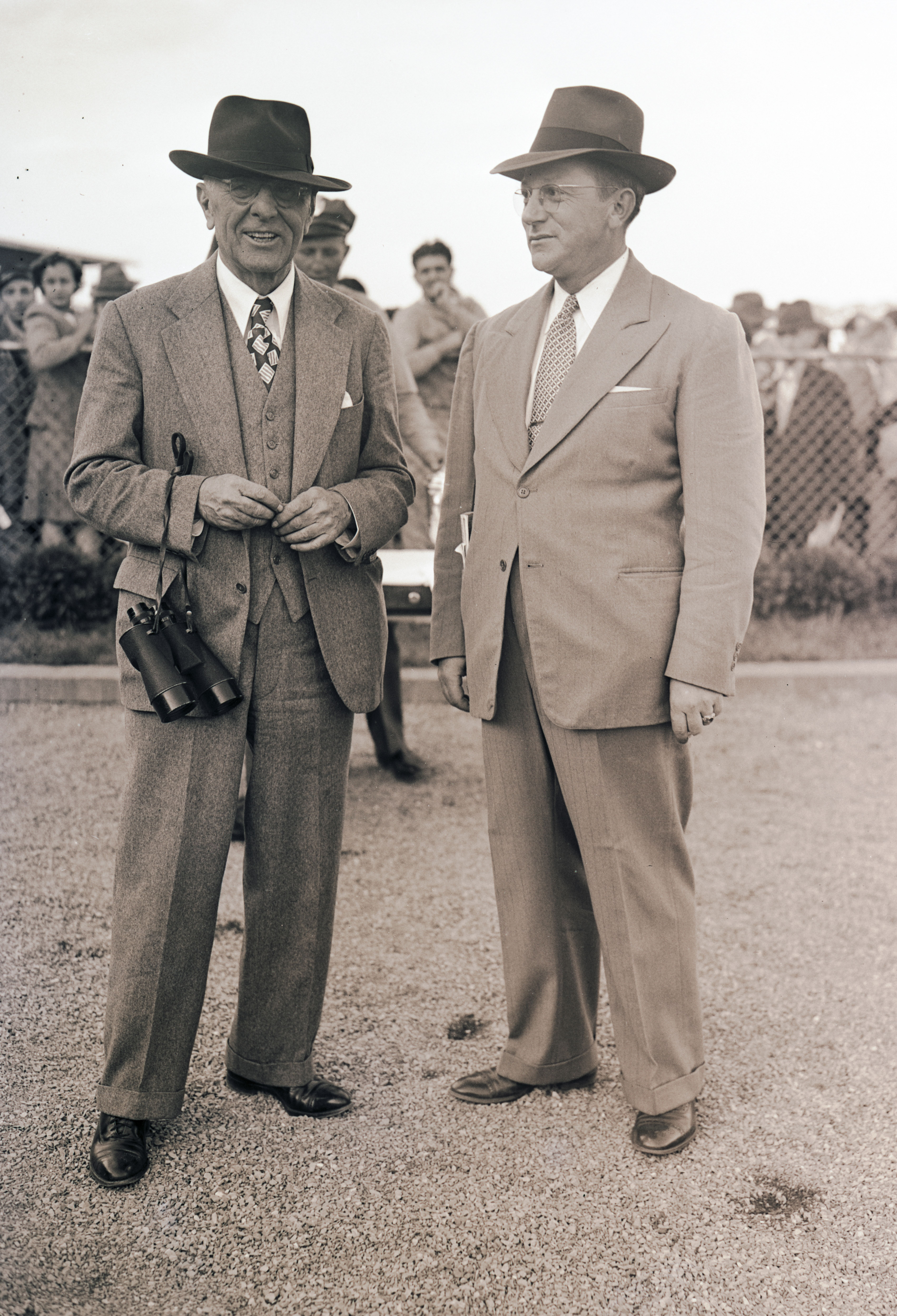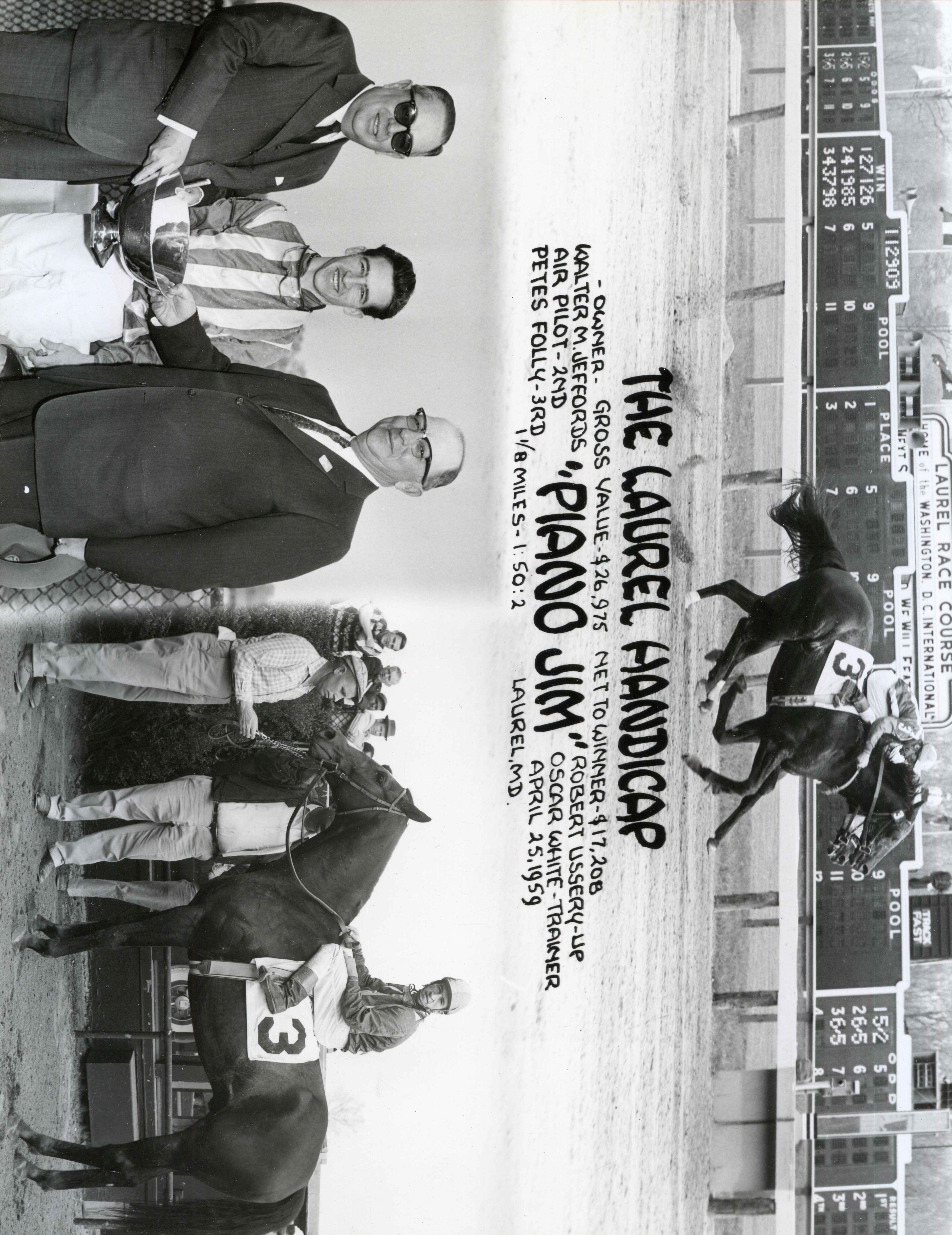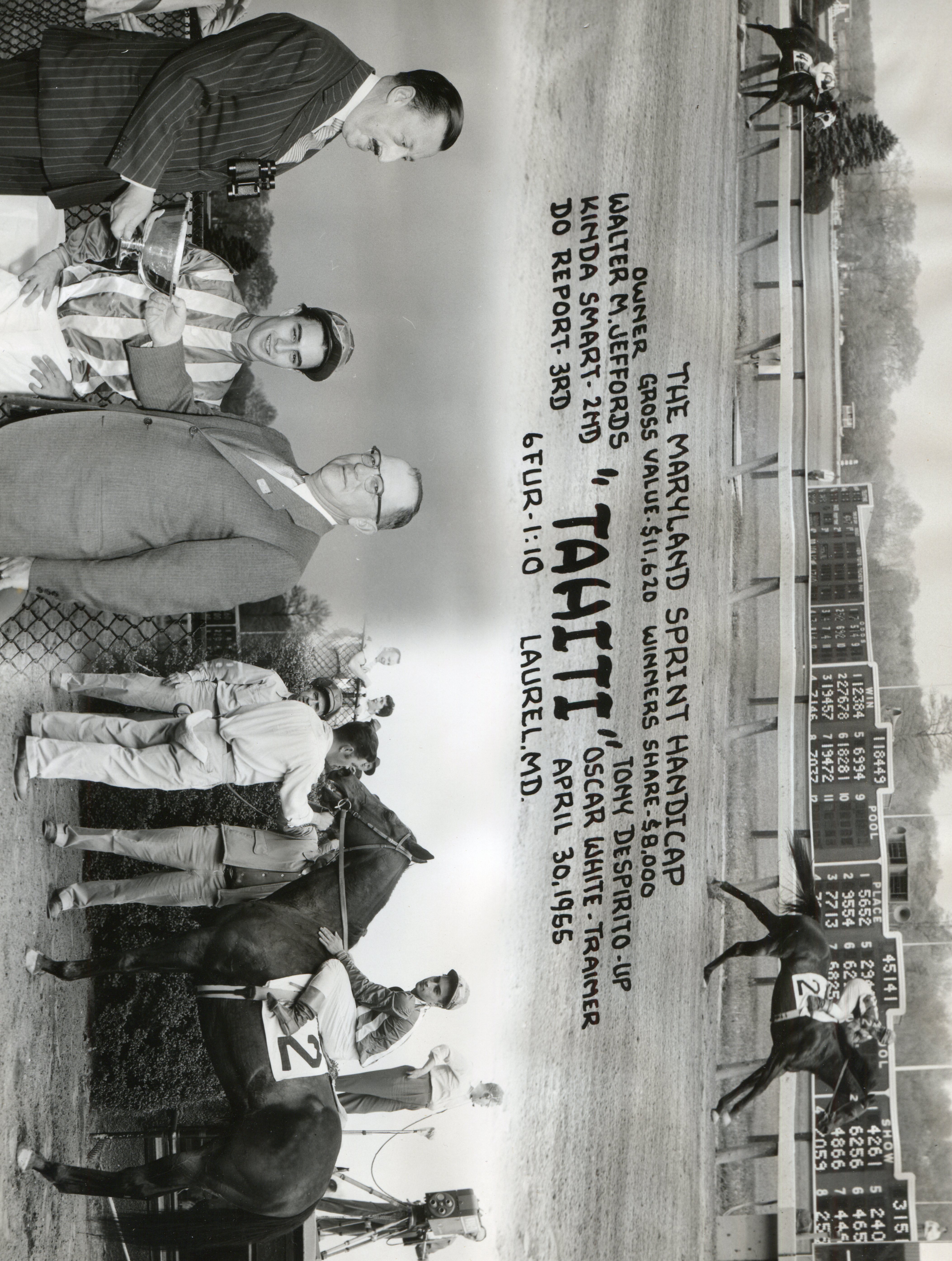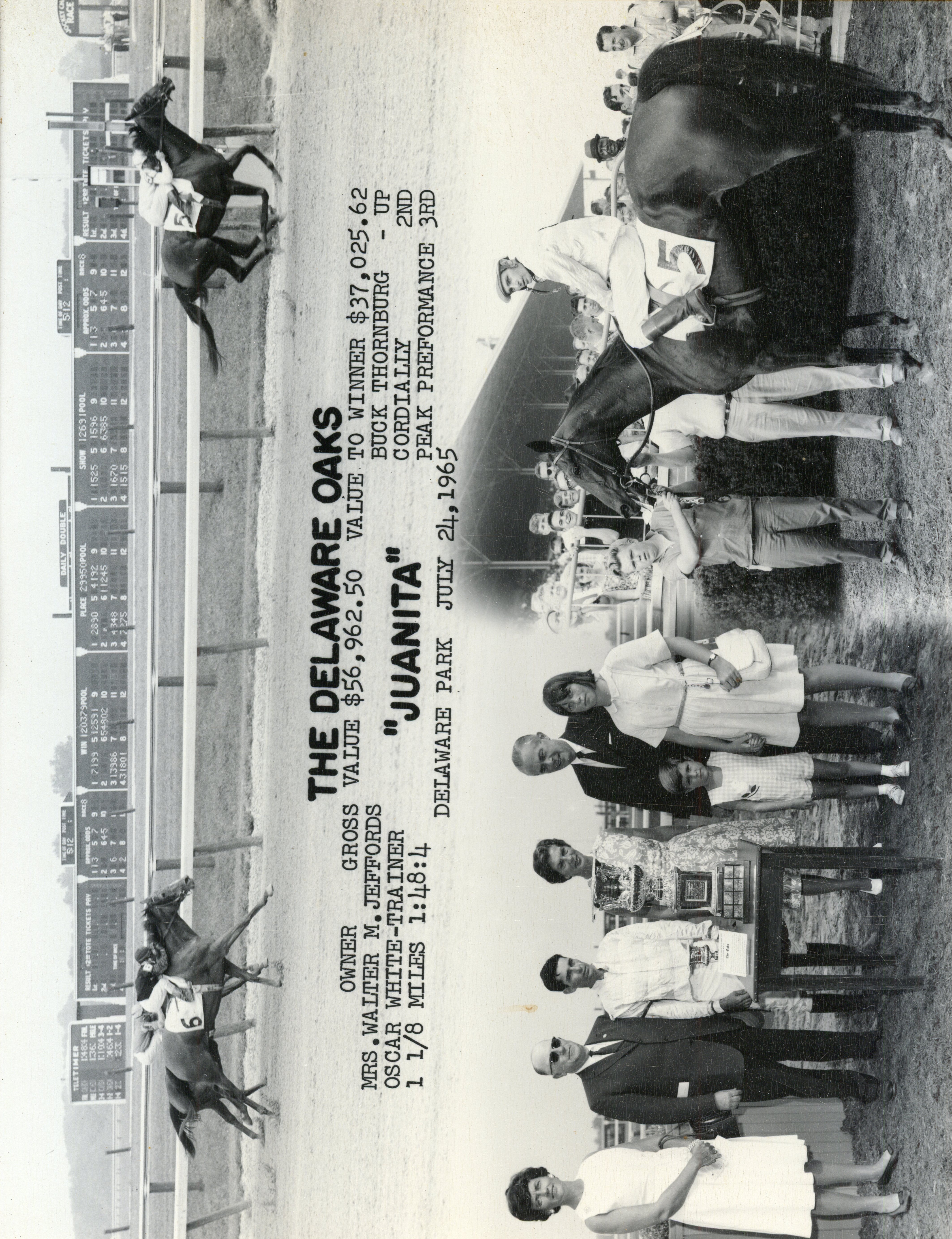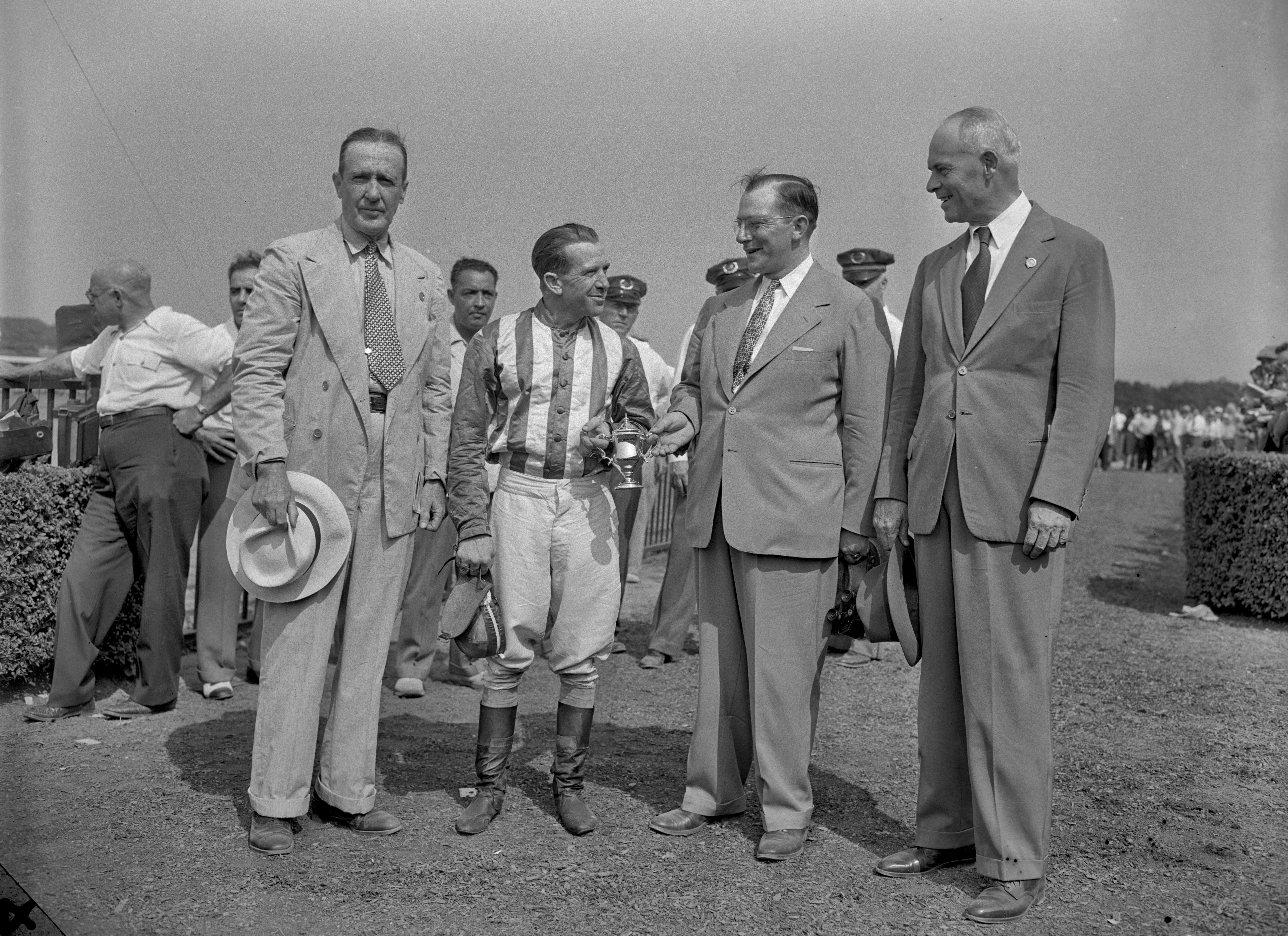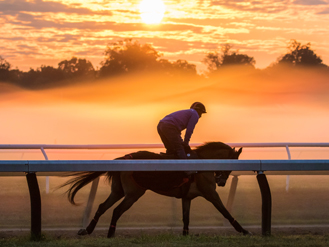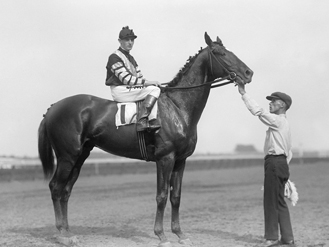Oscar White
Oscar White was hired to train for Mr. and Mrs. Walter Jeffords near the end of the 1940 racing season. He was ready.
That fall, at Bowie Race Course in Maryland, White saddled seven horses for the Jeffords family and won with five, with another finishing second. Stepping up to the opportunity, White had arrived at his position through determination, study, and steely resolve after working his way up the ladder in the Jeffords barn. He was already a dozen or so years into a remarkable career-long association with the family that would span more than a half-century and included considerable success at the highest levels of the game.
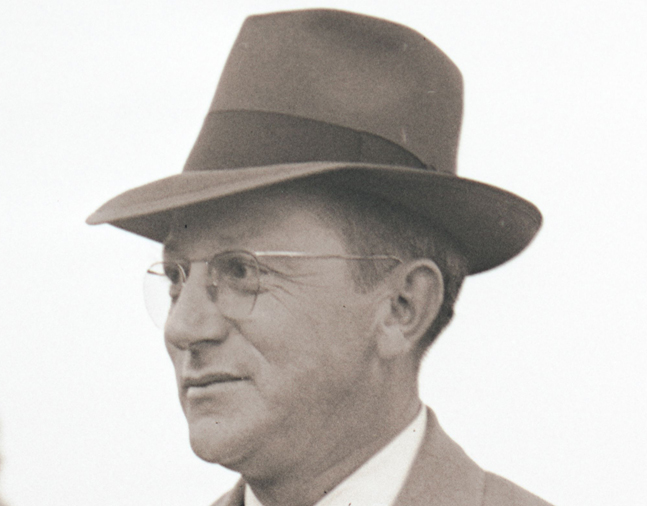
2022
Aug. 27, 1908, Pittsville, Maryland
April 7, 1983, Pittsville, Maryland
1940-1978
706
Biography
Oscar White was hired to train for Mr. and Mrs. Walter Jeffords near the end of the 1940 racing season. He was ready.
That fall, at Bowie Race Course in Maryland, White saddled seven horses for the Jeffords family and won with five, with another finishing second. Stepping up to the opportunity, White had arrived at his position through determination, study, and steely resolve after working his way up the ladder in the Jeffords barn. He was already a dozen or so years into a remarkable career-long association with the family that would span more than a half-century and included considerable success at the highest levels of the game.
Born in Pittsville, Maryland, on Aug. 27, 1908, White joined the Jeffords family’s racing stable while still a teenager in 1927, beginning as a groom at their Glen Riddle Farm in Berlin, Maryland. Prior to being named head trainer for the operation, White learned the ropes from several outstanding conditioners, including future Hall of Famers Preston Burch and Buddy Hirsch, as well as Scott Harlem and John Ward.
When White took over as head trainer, the Jeffords family stable was enduring lean times. And as it usually does — or should — it took a while for White’s program to take effect and show notable results at the track, the early burst of success at Bowie notwithstanding. Patience, patience, and more patience was a virtue understood by patrons of thoroughbred racing in that era.
When White’s program kicked in, it did so with gusto in 1944, when the trainer guided Pavot to an unbeaten 2-year-old championship season. After breaking his maiden on June 26 at Delaware Park, Pavot reeled off seven consecutive stakes wins for the stable during the next three months. They were the Christiana at Delaware Park; the Mayflower at Suffolk Downs; and the United States Hotel, Saratoga Special, Grand Union, Hopeful and Futurity at Belmont Park. Because of travel restrictions during World War II, there was no racing at Saratoga in 1943, 1944, and 1945. Thus, the United States Hotel, Saratoga Special, Grand Union, and Hopeful were run at Belmont.
Pavot ended the year as the leading money-winning thoroughbred of 1944 at $179,040. It was the first time since 1933 that a 2-year-old topped the earnings list. He was without doubt the best juvenile in the nation and at the time considered one of the best to have ever raced in the United States. With Pavot leading the way, White finished sixth among U.S. trainers in money won for 1944.
Pavot went on to win the Belmont Stakes in 1945, the Wilson at Saratoga in 1946, and the Jockey Club Gold Cup at Belmont Park in 1946. In the Jockey Club Gold Cup he defeated the great Stymie at level weights. In the 1946 Sussex Handicap at Delaware Park he defeated Stymie and Gallorette (both future Hall of Famers), and again defeated the latter in the Massachusetts Handicap.
Another good performer for White at this time was Trymenow, winner of the Whitney, Jersey Handicap, and Exterminator Handicap in 1945, and the Questionnaire Handicap in 1946. In addition to Pavot’s Wilson Stakes, White also sent out Natchez to win the Travers Stakes at Saratoga in 1946, and again ranked sixth among American trainers with money won.
White developed another champion for the Jeffords family in Kiss Me Kate, the best 3-year-old filly of 1951. Kiss Me Kate won a division of the Acorn Stakes at Belmont Park, the Delaware Oaks, the Gazelle Stakes at Aqueduct, and sealed her title with an authoritative eight-length win in the historic Alabama Stakes at Saratoga going 10 furlongs.
Another champion followed in 1952, when White guided One Count to honors as Horse of the Year and champion 3-year-old male. At his best in the heart of the season, One Count won the Belmont and Travers by open lengths, the Jockey Club Gold Cup, and the Empire City Gold Cup at Jamaica. With One Count leading the stable, White again was in the top 10 trainers in money earned.
Upon his retirement in 1978, White gave the edge to Pavot over One Count as he reflected upon his career.
“Most people might have guessed One Count, but I think it was Pavot,” he told Daily Racing Form on Oct. 30, 1978. He also selected Kiss Me Kate as the best female he trained.
White won 706 races, including 104 stakes. In addition to the aforementioned horses, his list included the Peter Pan (1946) and Jerome (1946) with Mahout; the Saratoga Cup (1948), Ladies (1947), and Beldame (1948) with Snow Goose; the Merchants and Citizens (1947), Manhattan (1948), Edgemere (1948) and Saratoga Handicap (1948) with Loyal Legion; the Monmouth Oaks (1949) and Alabama (1949) with Adile; the Alabama (1952) with Lily White; the Travers (1958) with Piano Jim; the Delaware Oaks (1965) with Jaunita; the Black Eyed Susan (1968) Molly Pitcher (1969), Maskette (1969), and Gallorette (1970) with Singing Rain; and the Gardenia (1970) with Eggy.
Eggy was White’s final stakes winner. At the time, the Gardenia was the richest stakes race for fillies in the country.
In addition to his two Belmont Stakes wins with Pavot and One Count, White sent out the winners of three editions of the Travers and Alabama. Other important stakes won by his runners include the Schuylerville (1944) with Ace Card; the Grand Union Hotel (1949) with Suleiman; the Flamingo (1951) with Yildez; the Selima (1963) with My Card; and the Delaware Oaks (1967) with Lewistown.
Oscar White’s loyal association with the Jeffords family — and their dedication to his patient style — was a model for the sport during his career. Upon his retirement, White thanked them for being “the best people in the world.”
White died in 1983 at the age of 74.
Achievements
Triple Crown Highlights
Won the 1945 Belmont Stakes — Pavot
Won the 1952 Belmont Stakes — One Count
Notable
— Trained 1952 Horse of the Year One Count
— Trained 1946 Champion 2-Year-Old Male Pavot
— Trained 1951 Champion 3-Year-Old Filly Kiss Me Kate
— Won 104 stakes races
— Trained 35 stakes-winning horses
— Won the Travers Stakes 1946, 1952, 1958
— Won the Maryland Handicap 1947, 1951, 1965
— Won the Alabama Stakes 1949, 1951, 1952
— Won the Delaware Oaks 1951, 1965, 1967
Media
